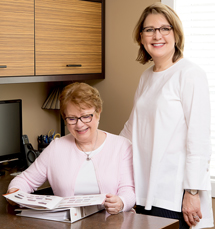Ask Carla Campbell why she became an independent manufacturers’ rep and immediately you get a one-word answer — “Freedom.”
Obviously, there’s more to it than that, but her determination to be her own boss and make her own decisions appears to be the driving force when it came to opening her own agency more than a decade ago. “I know freedom is a fairly broad consideration, but I really wanted to dictate for myself who I called on, when I called on them and how much time I spent traveling. Before I opened my own agency there was always the possibility someone would say to me that ‘No, now is not a good time to go to Alaska for business.’ Going out on my own let me make that decision for myself.”
Today as the president of Campbell Sales & Marketing in Tacoma, Washington, Campbell not only has that freedom to make her own decisions, she also brings a wealth of knowledge to her dealer clients in design, business and marketing with 30 years of experience in all facets of the kitchen business.
If that describes why Campbell became a rep, here’s how she got there: She graduated from the University of Wisconsin, Madison, with a degree in interior design. Following graduation, she worked for a lumberyard, cabinet distributor, custom shop and in retail sales in the Midwest for seven years. After a move to California, for four years she worked for KraftMaid Cabinetry as a regional showroom designer and trainer servicing the West Coast. She then took the opportunity to become a sales rep in the Pacific Northwest because it included — here we go again — travel to Alaska!
In 2000, Campbell’s involvement in the National Kitchen & Bath Association (NKBA) led to a position at Pacific Crest Industries (now Bellmont Cabinetry), developing their West Coast dealer network and managing their sales team. In 2009 she opened her doors as an independent representative servicing the Pacific Northwest and is currently working with several cabinet manufacturers and a wood countertop line.

Campbell looks at catalogs with Susan Campbell (left), administrative assistant at Campbell Sales & Marketing.
Knowing Customers and the Market
Armed with an enviable background in her market and with her customer base, Campbell explains that she began her career as a rep in a similar fashion to other reps. “If there were any surprises when I first opened my doors, it was that I had a lot to learn about running a business. On top of that, I had virtually no income in the beginning with the cabinet line that I started with. Fortunately, I was able to secure a couple of additional products, and things slowly got better as the recession ended.
As she looks back at her career, which finds her today as a one-person operation, Campbell notes, “When I started as a salesperson in the early ‘90s, I was just about the only female employee. While today things have changed a bit, I’d say we’re still only about 40 percent of the sales force.”
She goes on to reminisce about some of her early career experiences. “When I began it was pretty much a ‘good-old-boy’ business. I can recall one of my first customers asking me if I knew how to read a tape measure. He didn’t know that I probably knew more about building materials than he did. It was tough at first and I was determined to prove myself as a female in a heavily male-oriented business. I kept working on it — and was able to survive and thrive.”
An effective tactic that she employed to pave her way to success was carefully focusing on the businesses she wanted to work with. “In dealing with the larger distributors, I found it difficult to gain a foothold because of long-established ties with competitors. What I did instead was to focus on the mom-and-pop businesses, where I was able to deal directly with the owner and able to work one-on-one with the primary decision maker. It was there that the types of relationships I was looking for flourished. That’s where I was able to grow my business over the years. And, as the people I dealt with changed (with many women occupying purchasing or ownership positions), I was able to maintain and strengthen our partnership.”
Nurturing Relationships
Campbell stays on the subject of strong relationships when she notes, “My ability to have and enjoy those relationships is the major reason my agency has survived for as long as it has. Our business can be complicated, and a number of things can go wrong with a project. That’s why it’s so important for me to always be here to meet the needs of the dealers. One of my major goals is to strive to train them and keep them from being their own worst enemies. They know they can always depend upon me.”
She continues, “If anything can keep me up at night it’s that one of my dealers has a problem that I need to help them solve. I’d have to say that I’ve always gone above and beyond when it comes to taking care of dealers.”
While relationships with her dealers have obviously been key to her agency’s success, a similar dependence on relationships with principals is just as important. According to Campbell, “There are more than 5,000 cabinet manufacturers in the United States. The important thing for me was to position myself with those who had the best reputations, quality products and were the easiest to work with. Added to that is that I love working with those principals who are most interested in helping me develop the infrastructure of my agency.”
If the number of female salespeople in her industry serves as one important change, another is probably the immediate availability of information. “Our jobs as reps are to serve as the liaison between the factory and the dealer. We’ve got to not only market and sell products, but also to troubleshoot problems as they come up. We’re a little bit like a mediator. If the end user that the dealer is selling to is not satisfied, then something has to be taken care of — and we’ve got to take care of it.
“Here’s what’s changed — technology. With the advent of all the new technological tools, customers are able to research products much more extensively than ever before. That results in a huge benefit and at the same time a detriment. There’s a level of expectation that causes the consumer to believe that they are able to demand products in less time and for less money from our dealers. That’s resulted in our jobs becoming much more complicated as an intermediary between the two. Having said that, I love the customers that we work with and the challenges that they present every day.”
Of assistance in meeting those challenges, according to Campbell, has been her membership in MANA. “A fellow rep that I used to work with recommended MANA to me. I visited the association’s website and poked around a bit. Initially I noticed that there weren’t many members from or information specific to my industry. So, I thought there wouldn’t be much benefit for me. However, after meeting with MANA President and CEO Charley Cohon at an NKBA event, I revisited and learned there was quite a bit of benefit concerning finances, running an agency, putting a business plan together, and the importance of written contracts.”
MANA welcomes your comments on this article. Write to us at [email protected].


